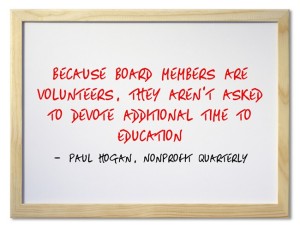Preaching – and Practicing- Board Governance Training
Posted: June 20, 2014 People who know me – or have read enough of my blogs – know I’m passionate about learning. Something else about me: I practice what I preach. I regularly beat the drum for board education, but I too need – and want – to continually expand my knowledge of board governance.
People who know me – or have read enough of my blogs – know I’m passionate about learning. Something else about me: I practice what I preach. I regularly beat the drum for board education, but I too need – and want – to continually expand my knowledge of board governance.
My June dashboard readers got the announcement and I’m pleased to repeat it here. I’ve been accepted into the BoardSource Certified Governance Trainer program that begins in July. I’m particularly proud to be BoardSource’s first candidate in the Hudson Valley. Reading and research confirm my experience that boards need targeted education to serve effectively (which as a certified governance trainer I’ll be better able to provide).
Read on for what I think are persuasive examples.
What the Stats Say
The most recent (2011) Daring to Lead National Study of Nonprofit Executive Leadership tracks board involvement. Executive directors identified in what areas anyone on the current board contributed significant effort to support their nonprofit. Stats for board participation in critical roles:
- Financial oversight: 73 percent
- Community ambassadorship: 65 percent
- Strategic planning and decision making: 59 percent
- Fund development: 47 percent
- Supervising/guiding executive director: 45 percent
- Policy/advocacy: 32 percent
The number for financial oversight is encouraging – except that study focus groups described the actual oversight as shallow. The other numbers range from respectable to pitiful. And, really, shouldn’t every number be 100 percent? And represent solid board activity? If these board roles aren’t being filled, that implies way too many members serving in name only.
Talking Sense About “Sacred” Boards
Then there’s an article in the May Nonprofit Quarterly provocatively titled, “Boards Cannot Be Sacred, Staff Cannot Be Saints, and Founders Should Never Be Martyrs.”
Author Paul Hogan states what I believe is true: because board members are volunteers, they are not asked to devote additional time to education. “No one wants to require them to take a course on the legal requirements of board service, or an overview course on nonprofit financial management, or even a two- or three-hour introduction to the organization they’re about to govern. ALL of these should be required.”
Bravo! I couldn’t agree more. Hogan also challenges all the players in a nonprofit to admit to what they don’t know. A know-it-all atmosphere is corrosive. And it’s the organization and cause it represents that suffer.
Cooperating to Learn
I never want to be mistaken for a know-it-all. But I am highly engaged and that generates ideas. I have one for board training.
The spark was lit at a New York University presentation by speakers urging nonprofits to collaborate. Why not a cooperative board education event? Bring the boards of local organizations together for Board Service 101. Everyone attends – new and veteran members. The program provides information every board member must know. Think of the networking possibilities!
Granted, this is not the forum for getting to know your organization. That has to be done individually.
But instituting an annual board member education event could elevate the effectiveness of organizations throughout an area, improving a region’s health in as many ways as its nonprofits contribute. An education event also publicly acknowledges that board service takes specialized knowledge; that board members are NOT parrots or rubber stampers. It gives board members the credit and respect they’re due by preparing them to do their best.
Looking for board governance training? Let’s talk.

